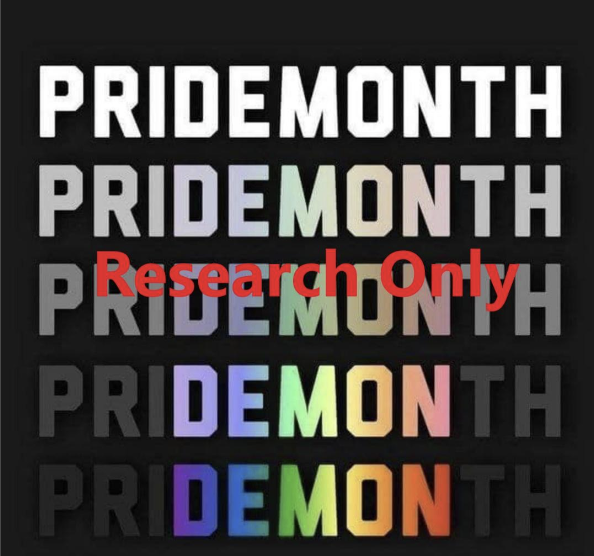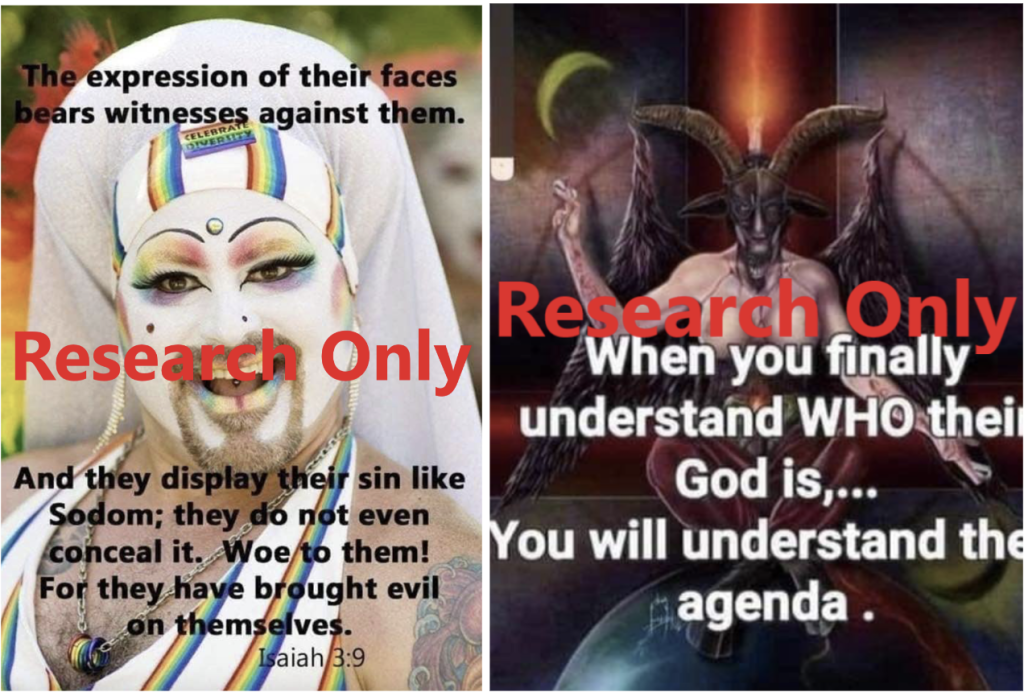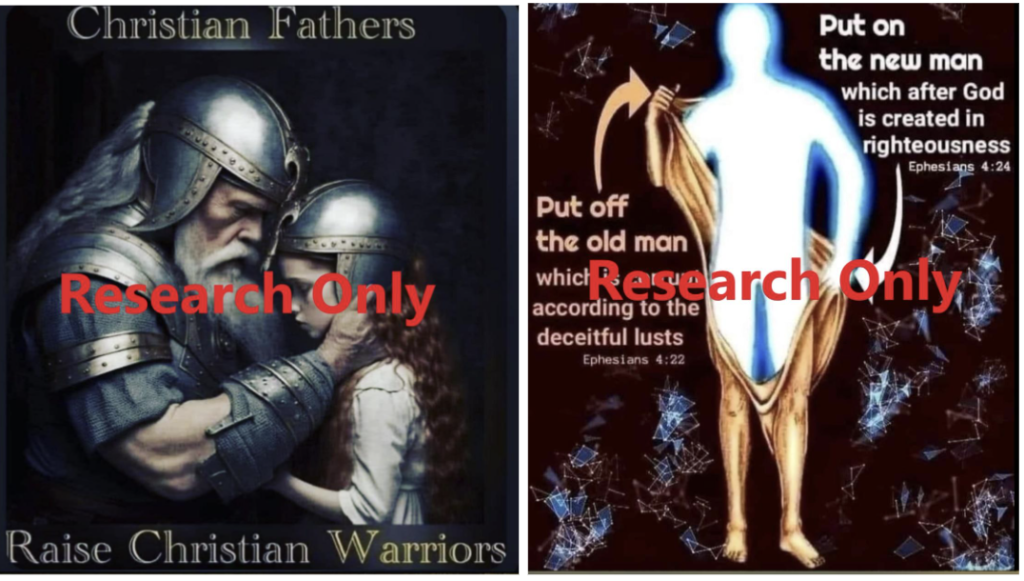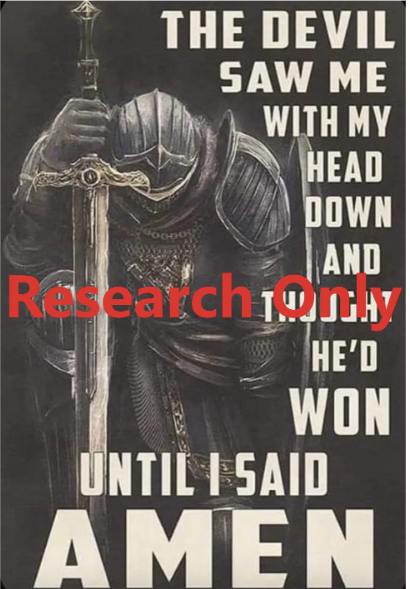Introduction
As the inquest into Australia’s first Christian extremist terror attack continues, this Insight explores the persistent use of religious millenarian rhetoric and imagery in private and public Facebook groups dedicated to right-wing conspiracism. While these posts generally fall within the platform’s terms of use, their portrayal of an apocalyptic battle between Christian warriors and the demonic forces of evil are undeniably similar to the beliefs that motivated the murder of three people in regional Queensland.
Context, Crises, and Conspiracies
The Australian Secret Intelligence Organisation (ASIO) has recently upgraded its national terrorism threat level from ‘possible’ to ‘probable’ for the first time since 2014. ASIO head Mike Burgess has attributed the assessment to the rise of ill-defined extremist ideologies driven by increasing social pressures.
Alongside this, July and August of 2024 have seen the inquest into the Wieambilla attacks take place in Queensland, Australia. Details are emerging of the event, where police officers responding to a missing person’s report were ambushed by the heavily armed Gareth, Stacey, and Nathaniel Train. Along with two police officers, neighbour Alan Dare was also murdered as he investigated a fire set by the Trains to flush out police.
The Trains, along with their American associate Donald Day, subscribed to the apocalyptic Christian ideology known as premillennialism. Day himself was found to have stockpiled weapons and threatened to kill both FBI agents and the Director-General of the World Health Organization.
The motive for the attack in Wieambilla was likely multi-faceted – the Trains held a range of conspiratorial beliefs, and Gareth in particular harboured resentment towards the police. However, the core factor of the trio’s extremist brand of Christianity is clear, with police being referred to as ‘devils and demons’, and biblical references throughout their communications with Day. In comments below a YouTube video, a pseudonymous Stacey Train wrote “After dealing with covert agents and tactics for some time now, Daniel [Gareth Train] believes that should they choose to cross the rubicon with public state actors our Father is giving up a clear sign.”
Premillennialism is a type of millenarianism – a school of thought dedicated to the idea of transformation and rebirth. In Premillennialism and the paranoid style, John M. Werly explains:
Commonly millennial movements exhibit an ideology deriving principally from Judeo-Christian messianism with frequent references to the reappearance of Jesus, the creation of a thousand year Kingdom of God and the Last Judgment. Although the exact nature of the new social order is most often vague, it still represents a quest for this-worldly, revolutionary change in the appeal to replace a totally-evil present order with a totally-good Utopian order.
Werly makes a distinction with regards to premillennialism, describing it as a more ‘pessimistic, revolutionary view’ than some other strands of millenarianism, in that the believer ‘has no faith in social progress and believes that all existent religious and secular institutions are thoroughly infested with satanic influences.’ Conditions are forecast to worsen until a fiery and destructive climax, after which the reign of Jesus Christ can commence.
Werly is one of many who observe that millenarian movements are well-suited to emerge in times of great crisis, wherein existential anxiety sets in for much of the populous. Gary Ackerman and Hayley Peterson describe the COVID-19 pandemic as an apt time for millenarians to ‘activate their doomsday scripts’. Likewise, Sarah MacMillen and Timothy Rush see millenarian influence in the emergence of QAnon as well as in historical accounts of behaviours during historical events such as the Black Death.
In writing about the appeal and danger of the Islamic State, Berger explains that apocalyptic millenarian thought is amenable to violent extremism due to its intensity, virality, and tendency to produce fanaticism. Furthermore, social media has an inherent ability to amplify the threat of apocalyptic millenarianism through three mechanisms:
- Temporal compression – a belief that the end and rebirth are imminent, helped by the frenetic pace of posts and updates.
- Social contagion – the ease in which communications, especially memes, travel and the relative safety for people to explore potentially dangerous people and their messages.
- Immersion – the ability for individuals to become engulfed by alternate realities due to their compelling ‘always on’ nature.
While the affordances of more secure and permissive platforms such as Telegram play a part for the seasoned extremist, Facebook has a history of use for organising and community building in the far right. Mainstream platforms have the potential to attract and mobilise followers, unlike much else. Moreover, while studies in the Australian context are scarce, the older nature of much of the conspiracist demographic makes one of the older and most established platforms a natural fit.
While specific references to the Trains and Wieambilla are scarce, similar premillennial, millenarian, and Christian extremist references can be seen in the words and imagery present in certain Facebook groups – one of the more popular and accessible haunts of Australian right-wing conspiracists. These spaces are littered with biblical verses referencing The Beast or dragons, and the ultimate victory of God’s warriors against the forces of evil.
Millenarian Content Online

Figures 1 and 2 present biblical verses cautioning against demonic forces.
While these may be considered relatively harmless in their vagueness and lack of connection to real-world events and people, other images identify specific people and events as satanic or demonic. These named enemies of Christ include the common target of pride and LGBTQ+ communities.
The targeting of these communities and those who support them has become more prevalent in the last few years. A large number of drag storytime events were cancelled in Melbourne and elsewhere due to threats of violence. Councils involved in running and promoting the events were also targeted. In South Australia, a library was forced to go into lockdown.
In a similar vein, another image from the Paris Olympics opening ceremony, controversial among conservative Christians, is overlayed with a quote about Sodom and Gomorrah, and their destruction. Others are more all-encompassing, suggesting simply that the out-group is best understood in terms of satanism and the devil.

Figures 3, 4 and 5 depict homophobic messaging, equating the LGBTQ community with demons.

Having identified the out-group (LGBTQ+ people) with the ultimate evil, it remains to identify the in-group – the ‘awake’ as described in the commonly accepted vernacular – as warriors for Christ. Exactly what this entails is not fully established, which leaves any risk of violence ambiguous. One image shows a being of pure light emerging from their worldly skin, alongside biblical verses about rebirth. In another, a kneeling knight in armour prepares to face Satan. In a similar vein, the importance of raising children to be ‘Christian warriors’ is proclaimed.


Figures 6, 7 and 8 emphasise the importance of raising ‘Christian warriors.’
Conclusion and Recommendations
Even in the context of an event such as the Wieambilla attack, such posts are difficult terrain, as they do not necessarily merit action under trust and safety policies, rather they may be classed as borderline content. Such content is protected by free speech norms in countries such as Australia, while still being problematic due to its context, or the lines it almost crosses.
Some guidance exists on how to approach such content however, it remains a complex issue. Removals or sanctions may not be appropriate or effective. Multi-stakeholder approaches and more long-term, holistic actions within civil society may be more warranted, though many of these are still in their infancy. At this time, however, we must recognise that the ideas that drove the Trains to their murderous actions persist, and we simply do not know what threats they continue to pose.
October will see the release of the review into the Online Safety Act 2021, which began in 2023. According to a spokesperson for Communications Minister Michelle Rowland, ‘the Commonwealth will continue engaging with experts, academics, parents and young people as part of the review of the Online Safety Act…the review is considering a range of new protections, including duty of care and how best to address new and emerging harms.’ Such protections, alongside the addressing of underlying offline issues, are well overdue.
